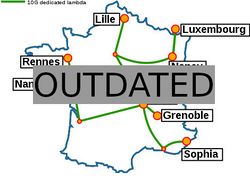Grid5000:Home
|
Grid'5000 is a large-scale and flexible testbed for experiment-driven research in all areas of computer science, with a focus on parallel and distributed computing including Cloud, HPC and Big Data and AI. Key features:
Grid'5000 is merging with FIT to build the SILECS Infrastructure for Large-scale Experimental Computer Science. Read an Introduction to SILECS (April 2018)
Older documents:
|
Random pick of publications
Five random publications that benefited from Grid'5000 (at least 2932 overall):
- Juliette Luiselli, Jonathan Rouzaud-Cornabas, Nicolas Lartillot, Guillaume Beslon. Genome Streamlining: Effect of Mutation Rate and Population Size on Genome Size Reduction. Genome Biology and Evolution, 2024, 16, 10.1093/gbe/evae250. hal-04905734 view on HAL pdf
- Dorian Goepp, Fernando Ayats Llamas, Olivier Richard, Quentin Guilloteau. ACM REP24 Tutorial: Reproducible distributed environments with NixOS Compose. 2024, pp.1-3. hal-04613983 view on HAL pdf
- Jean-Eudes Ayilo, Mostafa Sadeghi, Romain Serizel. Diffusion-based speech enhancement with a weighted generative-supervised learning loss. International Conference on Acoustics Speech and Signal Processing (ICASSP), IEEE, Apr 2024, Seoul (Korea), South Korea. 10.48550/arXiv.2309.10457. hal-04210729v2 view on HAL pdf
- Anna Kravchenko, Sjoerd Jacob De Vries, Malika Smaïl-Tabbone, Isaure Chauvot de Beauchêne. HIPPO: HIstogram-based Pseudo-POtential for scoring protein-ssRNA fragment-based docking poses. BMC Bioinformatics, 2024, 10.1186/s12859-024-05733-6. hal-04234486v2 view on HAL pdf
- Pierre-François Gimenez, Jérôme Mengin. Learning Conditional Preference Networks: an Approach Based on the Minimum Description Length Principle. IJCAI 2024 - 33rd International Joint Conference on Artificial Intelligence, Aug 2024, Jeju, South Korea. pp.3395-3403, 10.24963/ijcai.2024/376. hal-04572196 view on HAL pdf
Latest news
Failed to load RSS feed from https://www.grid5000.fr/mediawiki/index.php?title=News&action=feed&feed=atom: Error parsing XML for RSS
Grid'5000 sites
Current funding
As from June 2008, Inria is the main contributor to Grid'5000 funding.
INRIA |
CNRS |
UniversitiesUniversité Grenoble Alpes, Grenoble INP |
Regional councilsAquitaine |


